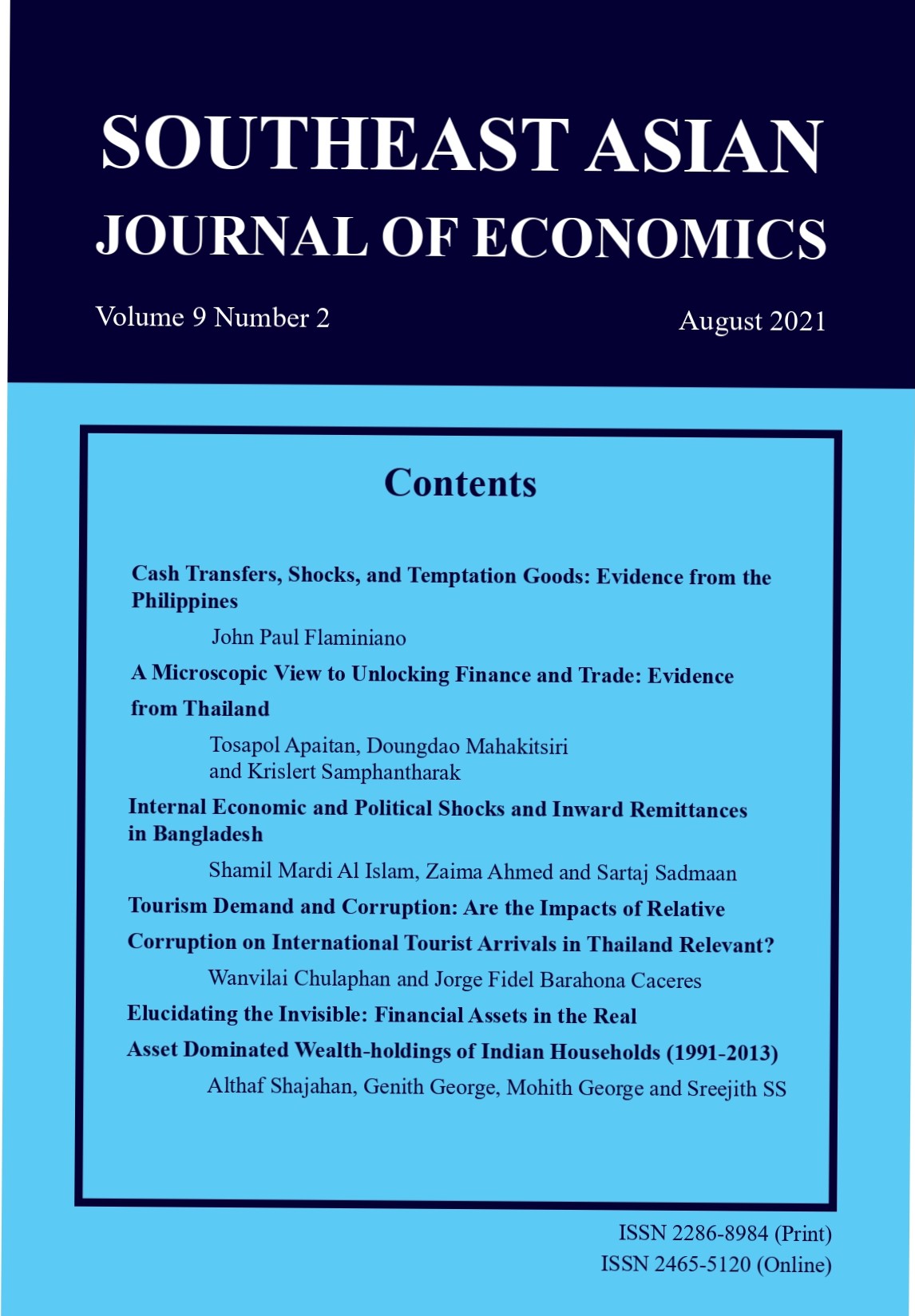Tourism demand and corruption: Are the impacts of relative corruption on international tourist arrivals in Thailand relevant?
Keywords:
relative corruption, tourism demand, Thailand, international tourism arrivalsAbstract
This article evaluates the impact of relative corruption on international tourist arrivals in Thailand using a generalized least squares estimator. We compile a panel dataset that consists of data from 29 countries from 2010 to 2017. The results suggest that relative corruption has a detrimental impact on international tourist arrivals. Moreover, the effect of relative corruption is greater as the distance of corruption between Thailand and the country of origin increases. As a consequence, tourist authorities should develop specific marketing strategies based on the relative levels of corruption exhibited in the tourist market. Furthermore, governments should build long-term and short-term tourism policies that aim at improving tourist perception of corruption in Thailand.
References
Amornvivat, S., Charoenphon, V., Pruedsaradch, P., Bunsupaporn, K., & Akaraphanth, L. (2016). Thai Tourism: Sustaining Success [Report]. Siam Commercial Bank Public Company Limited, Economic Intelligence Center. https://www.scbeic.com/en/detail/product/2953
Balli, F., Balli, H. O., & Cebeci, K. (2013, Aug). Impacts of exported Turkish soap operas and visa-free entry on inbound tourism to Turkey. Tourism Management, 37, 186-192. https://doi.org/10.1016/j.tourman.2013.01.013
Cheng, K. M. (2012). Tourism demand in Hong Kong: income, prices, and visa restrictions. Current Issues in Tourism, 15(3), 167-181. https://doi.org/10.1080/13683500.2011.569011
Demir, E., & Gozgor, G. (2017, 2017/05/01). What about relative corruption? The impact of the relative corruption on the inbound tourism to Turkey. International Journal of Tourism Research, 19(3), 358-366. https://doi.org/10.1002/jtr.2118
Dogru, T., & Bulut, U. (2018, 2018/08/01/). Is tourism an engine for economic recovery? Theory and empirical evidence. Tourism Management, 67, 425-434. https://doi.org/https://doi.org/10.1016/j.tourman.2017.06.014
Dogru, T., Sirakaya-Turk, E., & Crouch, G. I. (2017, Jun). Remodeling international tourism demand: Old theory and new evidence. Tourism Management, 60, 47-55. https://doi.org/10.1016/j.tourman.2016.11.010
Driffield, N., Mickiewicz, T., Pal, S., & Temouri, Y. (2010, 04/01). Bridging the Gap? Corruption, Knowledge and Foreign Ownership.
Duanmu, J.-L. (2011, 03/08). The effect of corruption distance and market orientation on the ownership choice of MNEs: Evidence from China. Journal of International Management, 17, 162-174. https://doi.org/10.1016/j.intman.2011.01.003
ECA. (2017). Cost of living [White Paper]. ECA International. https://www.eca-international.com/insights/white-papers/november-2017/eca-global-perspectives-cost-of-living
Goel, R. K., & Nelson, M. A. (2005, 2005/06/01). ECONOMIC FREEDOM VERSUS POLITICAL FREEDOM: CROSS-COUNTRY INFLUENCES ON CORRUPTION*. Australian Economic Papers, 44(2), 121-133. https://doi.org/10.1111/j.1467-8454.2005.00253.x
Lee, S. (2015, Aug). Research note: Quality of government and tourism destination competitiveness. Tourism Economics, 21(4), 881-888. https://doi.org/10.5367/te.2014.0377
Li, G., Song, H. Y., Cao, Z., & Wu, D. C. (2013, Jun). How competitive is Hong Kong against its competitors? An econometric study. Tourism Management, 36, 247-256. https://doi.org/10.1016/j.tourman.2012.11.019
McMann, K. M., Seim, B., Teorell, J., & Lindberg, S. (2019, Jul 17). Why Low Levels of Democracy Promote Corruption and High Levels Diminish It. Political Research Quarterly. https://doi.org/Unsp 1065912919862054
10.1177/1065912919862054
Poprawe, M. (2015). A panel data analysis of the effect of corruption on tourism. Applied Economics, 47(23), 2399-2412. https://doi.org/10.1080/00036846.2015.1005874
Saha, S., Su, J. J., & Campbell, N. (2017, Feb). Does Political and Economic Freedom Matter for Inbound Tourism? A Cross-National Panel Data Estimation. Journal of Travel Research, 56(2), 221-234. https://doi.org/10.1177/0047287515627028
Sekkat, K., & Méon, P.-G. (2005, 01/01). Does Corruption Grease or Sand the Wheels of Growth? Public Choice, 122, 69-97. https://doi.org/10.1007/s11127-005-3988-0
Song, H., & Li, G. (2008, Apr). Tourism demand modelling and forecasting - A review of Recent research. Tourism Management, 29(2), 203-220. https://doi.org/10.1016/j.tourman.2007.07.016
Song, H., Witt, S. F., & Li, G. (2003, 2003/12/01). Modelling and Forecasting the Demand for Thai Tourism. Tourism Economics, 9(4), 363-387. https://doi.org/10.5367/000000003322663186
Song, H. Y., Gartner, W. C., & Tasci, A. D. A. (2012, Apr). Visa restrictions and their adverse economic and marketing implications - Evidence from China. Tourism Management, 33(2), 397-412. https://doi.org/10.1016/j.tourman.2011.05.001
Song, H. Y., Li, G., Witt, S. F., & Fei, B. G. (2010, Mar). Tourism demand modelling and forecasting: how should demand be measured? Tourism Economics, 16(1), 63-81. https://doi.org/Doi 10.5367/000000010790872213
Song, H. Y., Qiu, R. T. R., & Park, J. (2019, Mar). A review of research on tourism demand forecasting. Annals of Tourism Research, 75, 338-362. https://doi.org/10.1016/j.annals.2018.12.001
Stauvermann, P. J., & Kumar, R. R. (2017, Aug). Productivity growth and income in the tourism sector: Role of tourism demand and human capital investment. Tourism Management, 61, 426-433. https://doi.org/10.1016/j.tourman.2017.03.006
Tang, C. F. (2018). The impacts of governance and institutions on inbound tourism demand: evidence from a dynamic panel data study. Asia Pacific Journal of Tourism Research, 23(10), 1000-1007. https://doi.org/10.1080/10941665.2018.1513052
Tang, C. F., & Tan, E. C. (2016). The determinants of inbound tourism demand in Malaysia: another visit with non - stationary panel data approach. Anatolia-International Journal of Tourism and Hospitality Research, 27(2), 189-200. https://doi.org/10.1080/13032917.2015.1084345
Tang, J. J. (2018, Oct). Evaluation of the Forecast Models of Chinese Tourists to Thailand Based on Search Engine Attention: A Case Study of Baidu. Wireless Personal Communications, 102(4), 3825-3833. https://doi.org/10.1007/s11277-018-5413-2
Tang, Z. J. (2014, Nov). Sustainable Tourism and Property Rights: A Case Study on the World Heritage Site of Wulingyuan in China from the Perspective of Property Rights Economics. Historic Environment-Policy & Practice, 5(3), 275-287. https://doi.org/10.1179/1756750514z.00000000063
Yap, G., & Saha, S. (2013, //). Do Political Instability, Terrorism, and Corruption Have Deterring Effects on Tourism Development Even in the Presence of Unesco Heritage? A Cross-Country Panel Estimate. Tourism Analysis, 18(5), 587-599. https://doi.org/10.3727/108354213X13782245307911
Downloads
Published
How to Cite
Issue
Section
License
Copyright (c) 2023 SOUTHEAST ASIAN JOURNAL OF ECONOMICS

This work is licensed under a Creative Commons Attribution-NonCommercial-NoDerivatives 4.0 International License.
The submission of a manuscript implies that the paper is an original work and has not been published elsewhere. The author(s) authorize the journal to reproduce or distribute the paper in printed or other electronic forms.







